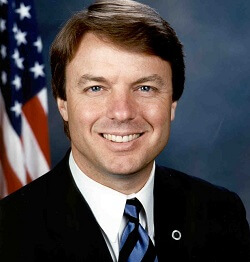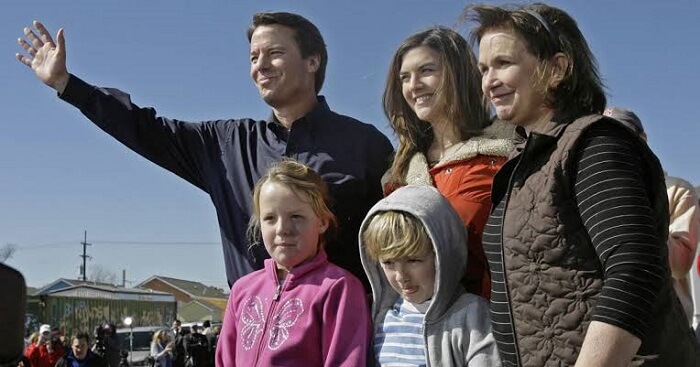John Edwards
Johnny Reid Edwards (born June 10, 1953) is an American lawyer and former politician representing North Carolina in the United States Senate. He ran for vice president alongside John Kerry in 2004 but lost to incumbents George W. Bush and Dick Cheney. In 2004, and 2008, he ran for the Democratic presidential nomination. In the 1998 Senate election in North Carolina, Edwards defeated incumbent Republican Lauch Faircloth. He chose to leave the Senate near the end of his six-year term to focus on a Democratic presidential candidacy in 2004. He finally became the Democratic vice presidential contender in 2004, competing alongside Massachusetts Senator John Kerry. Following Kerry's defeat by incumbent President George W. Bush, Edwards began working full-time at the One America Committee, a political action committee he founded in 2001. He was appointed director of the Center on Poverty, Work, and Opportunity at the University of North Carolina at Chapel Hill School of Law. He also worked as a consultant for Fortress Investment Group LLC. Following his 2008 presidential campaign, Edwards was indicted on six felony charges by a federal grand jury on June 3, 2011, for violating several federal campaign contribution regulations to conceal an extramarital affair, which he later admitted. He was found not guilty on one count, and the court declared a mistrial on the remaining five accusations after the jury couldn't agree. The remaining accusations were dismissed, and Edwards was not retried even though he was not convicted of any crime. He had an extramarital affair and fathered a child when his wife, Elizabeth, died of cancer, severely harming his public image and effectively terminating his political career. EducationEdwards was born in Seneca, South Carolina, on June 10, 1953, to Wallace Reid Edwards and Catharine Juanita "Bobbie" Edwards (née Wade). During Edwards' childhood, the family relocated several times until settling in Robbins, North Carolina, where his father worked as a textile mill floor worker before being promoted to supervisor. His mother ran a roadside antique-finishing company before becoming a mail carrier after his father lost his job. The family was members of a Baptist church. Edwards, a high school football star, was the first person in his family to attend college. He spent one semester at Clemson University before transferring to North Carolina State University. In 1974, he graduated from NCSU with high honors with a bachelor's degree in textile technology with a 3.8 GPA. He later earned his Juris Doctor from the University of North Carolina School of Law (UNC). Career
After law school, Edwards clerked for federal judge Franklin Dupree in North Carolina before becoming an associate at the Nashville law firm of Dearborn & Ewing in 1978. He mostly handled trial work, defending a Nashville bank and other corporate clients. Among Edwards' coworkers was Lamar Alexander, a Republican and future governor of Tennessee as well as a U.S. Senator from Tennessee. In 1981, the Edwards family returned to North Carolina, residing in Raleigh, where he joined the firm of Tharrington, Smith & Hargrove. In 1984, Edwards was assigned to an unwinnable medical malpractice claim; the firm had accepted it merely as a courtesy to an attorney and state legislator who did not want to keep it. Nonetheless, Edwards obtained a $3.7 million victory for his client, who had suffered lifelong brain and nerve damage from a doctor's overdose of the anti-alcoholism medicine Antabuse during alcohol aversion therapy. In other cases, Edwards sued the American Red Cross three times, alleging that tainted blood supplies transmitted AIDS, each time ending in a confidential settlement, and defended a North Carolina newspaper against a libel accusation. In 1985, Edwards defended a five-year-old kid with cerebral palsy whose mother's doctor chose not to perform an urgent Caesarean birth when a fetal monitor indicated she was in distress. Edwards obtained a $6.5 million verdict for his client, but the presiding judge overturned the award five weeks later on the grounds that it was "excessive" and appeared "to have been given under the influence of passion and prejudice," adding that "the evidence was insufficient to support the verdict." He gave the plaintiffs $3.25 million, half of the jury's award, but the child's family appealed and got a settlement of $4.25 million. By winning this case, the North Carolina precedent of physician and hospital responsibility for failing to evaluate whether the patient comprehended the hazards of a particular surgery was established. Following this trial, Edwards rose to national prominence as a plaintiff's lawyer. In the years thereafter, he has launched at least twenty similar claims, obtaining verdicts and settlements totaling more than $60 million for his clients. Edwards founded his own firm, Kirby & Holt, in Raleigh in 1993 with a buddy, David Kirby. He rose to prominence as North Carolina's leading plaintiffs' attorney. His most notable case was a 1996 product liability action against Sta-Rite, the producer of a faulty pool drain cover. Valerie Lakey was a five-year-old girl who suffered a pool suction-drain accident. When she sat on an open pool drain whose protective cover had been removed by other children at the pool due to the swim club's failure to install the surface properly, she was disemboweled by the suction power of the pool drain pump. Despite 12 earlier lawsuits alleging similar claims, Sta-Rite continues to manufacture and market drain covers without warnings. Sta-Rite claimed that an additional notice would have made no impact because pool owners were already aware of the need of keeping the cover tight. Edwards talked to the jury for an hour and a half during his closing statements, and he mentioned his son, Wade, who was killed just before testimony began. North Carolina Lawyers Weekly editor Mark Dayton afterwards described it as "the most spectacular legal performance I have ever witnessed." The family was given $25 million by the jury, the biggest personal injury award in North Carolina history. Following Edwards' hefty victory against a trucking firm whose employee was involved in a deadly accident, the North Carolina legislature established legislation banning such damages unless the employer had directly sanctioned the individual's behavior. During his first presidential campaign, Edwards (together with John Auchard) published Four Trials, an autobiographical book based on cases from his legal career, in December 2003. According to this book, Edwards' decision to leave the legal profession and run for public office was spurred by the success of the Sta-Rite case and the death of his son (Edwards had anticipated his son would eventually join him in private law practice). Edwards was elected to the United States Senate as a Democrat in 1998, defeating incumbent Republican Senator Lauch Faircloth. Despite being the underdog, Edwards defeated Faircloth by a margin of 83,000 votes, 51.2% to 47.0%. Edwards advocates for policies to reduce poverty in the United States, such as generating one million housing vouchers over five years to resettle poor people in middle-class communities. "If we honestly believe that we are all equal, then we should live together," Edwards says. He also supports projects such as "College for Everyone." Although Edwards initially supported the Iraq War, he later changed his mind and penned an op-ed in The Washington Post in November 2005 in which he expressed regret for voting for the Iraq War Resolution and proposed three alternatives for success in the battle. He criticized the "troop surge" in Iraq, advocated for departure, and urged Congress to suspend money for the war unless a schedule for exit was established. In terms of social policy, Edwards supports abortion rights and has proposed a universal healthcare plan that would require all Americans to purchase health insurance, "requires that everybody get preventive care," and require employers to provide health care insurance or face taxation to fund public health care. He favours a road to citizenship for illegal immigrants, opposes a constitutional amendment prohibiting same-sex marriage, and favours repealing the Defense of Marriage Act (DOMA). Edwards supported measures to reduce global warming and was the first presidential contender to claim that his campaign was carbon-neutral. Senate TenureEdwards was in charge of the depositions of witnesses Monica Lewinsky and fellow Democrat Vernon Jordan, Jr. During President Bill Clinton's impeachment trial in the Senate in 1999. During the 2000 presidential campaign, Edwards was on Democratic nominee Al Gore's short list for vice president (along with John Kerry and Gore's eventual choice, Joe Lieberman). On Meet the Press on October 10, 2004, he defended his vote, saying "Knowing what I know now, I would have voted for the resolution because it was the correct thing to do to give the president the power to confront Saddam Hussein... Saddam Hussein, in my opinion, posed a real threat. That is what I believe, and it is why I support our voting on the resolution ". He later changed his views about the conflict and apologised for voting for military authorization. Edwards also supported the Patriot Act. Edwards was mainly pro-choice and backed affirmative action and the death penalty, among other things. The Fragile X Research Breakthrough Act of 1999 was one of his first bills. With the Spyware Control and Privacy Protection Act, he was also the first to introduce comprehensive anti-spyware legislation. He supported repealing the Bush administration's tax cuts and abolishing mandatory minimum sentences for nonviolent offenders. Edwards largely favored increased legal immigration to the United States while collaborating with Mexico to improve border security and combat illegal trafficking. Edwards served on the United States Senate Select Committee on Intelligence, the United States Senate Committee on Judiciary, and the New Democrat Coalition. Before the 2004 Senate race, Edwards announced his retirement from the Senate and supported former White House Chief of Staff Erskine Bowles as his replacement; Bowles was defeated in the election by Republican Richard Burr. Personal Life
He met Elizabeth Anania at UNC. They got married in 1977 and had four kids (Wade in 1979, Cate in 1982, Emma Claire in 1998, and Jack in 2000). Edwards also has a child from his extramarital relationship named Frances Quinn Hunter, who was born in 2008 with his former mistress Rielle Hunter. Edwards denied fatherhood for more than two years until ultimately admitting it in 2010. Wade died in an automobile accident in 1996 when strong winds blew his Jeep off a North Carolina roadway. Three weeks before his death, he was honored at The White House by First Lady Hillary Clinton as one of ten finalists in an essay contest sponsored by the National Endowment for the Humanities and the Voice of America for an essay he wrote on entering the voting booth with his father. Wade, accompanied by his parents and sister, went on to see North Carolina Sen. Jesse Helms, who later put Wade's essay and obituary into the Congressional Record. In memory of their son, Edwards and his wife established the Wade Edwards Foundation, whose mission is "to reward, support, and inspire young people in the pursuit of excellence." The Wade Edwards Learning Lab at Wade's high school, Needham B. Broughton High School in Raleigh, was financed by the Foundation, as were scholarship competitions and essay awards. Elizabeth Edwards announced her diagnosis of breast cancer on November 3, 2004. She had chemotherapy and radiotherapy while working for the Democratic Party and her husband's One America Committee. On March 22, 2007, during his campaign for the Democratic presidential nomination in 2008, Edwards and his wife disclosed that his cancer had returned; she had been diagnosed with stage IV breast cancer, with newly detected metastases to the bone and perhaps to his lung. They said that the cancer was "no longer curable, but is completely treatable" and that they planned to continue campaigning together with an occasional break when she required treatment. In June 2010, Elizabeth published a book called Resilience. Her book is about the struggles of her marriage and how she was affected by her husband's affair. In the book, Elizabeth talks about how long she was in the dark about the affair and how often her husband, John, lied about the details of the experience. She never acknowledges John's mistress by name, but instead refers to her as a "parasitic groupie" who is "pathetic." Elizabeth also discusses how she attempted to forgive her husband after discovering the affair but found it difficult to forgive him when he continued to lie. Following Edwards' admission on January 21, 2010, that he fathered a child with his mistress, Elizabeth obtained a legal separation from him. She planned to file for divorce following a mandatory one-year waiting period. Elizabeth died of metastatic breast cancer on December 7, 2010, at the age of 61. InfidelityThe National Enquirer began a series of allegations in October 2007 suggesting an adulterous liaison between Edwards and former campaign worker Rielle Hunter. By July 2008, several news outlets speculated that the allegations, which now included that he fathered a child with Hunter and had visited her and the baby girl at the Beverly Hilton Hotel in Beverly Hills, California, had harmed Edwards' chances for the Vice Presidency as well as other positions such as Attorney General. The press did not widely cover the story for some time until Edwards acknowledged the affair after initially denying the charges. John Edwards made a press release on January 21, 2010, admitting that he fathered Hunter's child. Edwards admitted to having an affair with Hunter in 2006 in a statement and an interview with ABC News's Bob Woodruff on August 8, 2008, but denied being the father of her child. He admitted to being dishonest in denying the entire Enquirer story, admitting that some of it were true, but claiming that the affair ended long before the child was conceived. He also stated that he was willing to take a paternity test, but Hunter stated that she would not participate in a DNA test "now or in the future." Andrew Young, a campaign aide, initially claimed that he, not Edwards, was the child's father. Young later recanted that claim, claiming that Edwards had always known he was the child's father and had pleaded with him to accept false responsibility. Young further claimed to have set up private meetings between Edwards and Hunter and that Edwards once calmed an anxious Hunter by promising her that after his wife died, he would marry her in a rooftop ceremony in New York with an appearance by the Dave Matthews Band. Young also maintains that Edwards asked him to "Get a doctor to fake the DNA results and to steal a diaper from the baby so he could secretly do a DNA test to find out if this is indeed his child." Young's book detailing the affair was published on February 2, 2010. Young also began working with Aaron Sorkin on a film based on the book The Politician about the affair. In Orange County, North Carolina, a judge ruled on February 23, 2012, that Young and his wife could not publicize the film. The judge also ordered the court to destroy an alleged "sex tape" of Edwards and Hunter. The judge also limited the use of materials already in the public domain to those that were already in the public domain. All other photos and materials that have not yet been released may be used solely for family purposes. In response to the scandal surrounding Edwards' extramarital affair and subsequent attempts to cover it up, he stated, "I am a sinner, but not a criminal." Newspapers reported in May 2009 that Edwards' campaign was being investigated for converting campaign funds to personal use in connection with the affair. Edwards stated that the campaign was cooperating with the investigation. The relevant United States attorney declined to comment. In the same month, ABC News' George Stephanopoulos reported that members of Edwards' campaign staff had told him that they were planning a "doomsday strategy" to derail his campaign if he got close to the nomination. The report, according to Joe Trippi, a senior advisor to the campaign, is "complete bullshit." Rielle Hunter testified before the grand jury investigating this case in August 2009. Hunter broke her silence during an interview with GQ magazine on March 15, 2010, and revealed new details about the affair. In late 2011, The National Enquirer and RadarOnline.com reported that Edwards had asked his former mistress to move into his North Carolina home, where he had previously lived with his wife. Rielle Hunter revealed her split from Edwards on the same day she published a book about their relationship in 2012. Hunter appeared on Steve Harvey on February 9, 2016, in her first televised interview in nearly five years. Hunter, then 51, stated that the couple remained together until February 2015. After his political career ended, Edwards co-founded the Raleigh law firm, Edwards Kirby, with attorneys David Kirby and William Bystrynski, specializing in medical malpractice cases. In 2015, his daughter Cate was the managing attorney of the firm's San Diego office.
Next TopicJohn Lewis
|
 For Videos Join Our Youtube Channel: Join Now
For Videos Join Our Youtube Channel: Join Now
Feedback
- Send your Feedback to [email protected]
Help Others, Please Share









